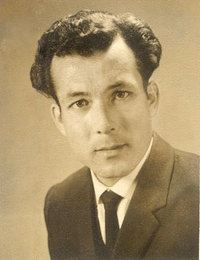
Shiva Shankar
Art director, Music director, Dialogue writer, Associate director
Shiva Shankar Manandhar (शिव शंकर मानन्धर; 22 February 1932 – 14 November 2004) was a singer, music composer of Nepali songs and the chief actor in the first Nepali movie, Aama. For nearly a half century beginning from 1950 to late 1990, his name has probably been mentioned more often in books, journals, lectures and conversations about Nepalese music than any other musicians. Singing and composing music for songs of love, tragedy, devotion (bhajan) and patriotism, he pioneered many of the genres of modern Nepali music. He has composed music for around 1,200 Nepalese songs. He himself sang about three hundred songs. For these contributions Shankar received dozens of prestigious national awards. Shankar was recruited to the service of the state-owned Radio Nepal in 1951 by Bal Krishna Sama, the pre-eminent playwright of Nepal. Soon he was tasked with exploring and mentoring new musical talent and overseeing the recording of songs in the studio for radio broadcast. Together with his colleague Nati Kaji, he made Radio Nepal an institution for breeding modern Nepalese music and songs. All Nepalese singers and musicians of the later half of the twentieth century came into prominence through this institution. Radio Nepal fostered not only the in-country musical talents, but also motivated several prodigious musicians of Darjeeling (India) to blossom in Nepal. They included Ambar Gurung, Gopal Yonzan, Aruna Lama and several others. While working at Radio Nepal, Shiva Shankar composed music for many prominent Nepalese singers. These included Tara Devi (singer), Mira Rana, Nirmala Shrestha, Gyanu Rana, Aruna Lama, Kunti Muktan, Ganga Malla, Puspa Nepali, Narayan Gopal, Prem Dhwoj Pradhan, Yogesh Vaidhya, Udit Narayan, Dhruba KC, Manik Ratna, Deep Shrestha, Bhakta Raj, Bacchu Kailash, Rubi Joshi, and Deepak Bajracharya. He composed music for prominent lyricists such as Ram Man Trishit, Kiran Kharel, Bhabuk, Yadab Kharel, Laxman Lohani, and MBB Shah (Mahendra of Nepal). Performing for fifty years, he helped Nepalese music attain popularity in what was termed the "Golden Age". Besides creating popular melodies, he also experimented with innovations in Nepalese music. He demonstrated how folk songs rendered with a few simple musical instruments could be enriched with an ensemble of modern contemporary orchestra instruments. The trend of modernization with the introduction of pop-style songs, which Shankar played a large role in starting, catalyzed the emergence of the present day full-fledged Nepalese pop songs. Although he pioneered changes and innovation, he always advocated for preserving the unique essence of Nepalese style, so that Nepalese songs would not be overshadowed by foreign songs and music. Shankar played the leading role of a "Lahure Dai" in the film Aama (Mother), the first Nepali feature movie, produced in 1964 (2021 BS) by the Government of Nepal. However, he did not pursue an acting career except for a few cameo appearances in documentaries. Nevertheless, he composed music for several movies in the early days of the Nepalese film industry.
Shiva Shankar Manandhar (शिव शंकर मानन्धर; 22 February 1932 – 14 November 2004) was a singer, music composer of Nepali songs and the chief actor in the first Nepali movie, Aama. For nearly a half century beginning from 1950 to late 1990, his name has probably been mentioned more often in books, journals, lectures and conversations about Nepalese music than any other musicians.
Singing and composing music for songs of love, tragedy, devotion (bhajan) and patriotism, he pioneered many of the genres of modern Nepali music. He has composed music for around 1,200 Nepalese songs. He himself sang about three hundred songs. For these contributions Shankar received dozens of prestigious national awards.
Shankar was recruited to the service of the state-owned Radio Nepal in 1951 by Bal Krishna Sama, the pre-eminent playwright of Nepal. Soon he was tasked with exploring and mentoring new musical talent and overseeing the recording of songs in the studio for radio broadcast. Together with his colleague Nati Kaji, he made Radio Nepal an institution for breeding modern Nepalese music and songs. All Nepalese singers and musicians of the later half of the twentieth century came into prominence through this institution. Radio Nepal fostered not only the in-country musical talents, but also motivated several prodigious musicians of Darjeeling (India) to blossom in Nepal. They included Ambar Gurung, Gopal Yonzan, Aruna Lama and several others.
While working at Radio Nepal, Shiva Shankar composed music for many prominent Nepalese singers. These included Tara Devi (singer), Mira Rana, Nirmala Shrestha, Gyanu Rana, Aruna Lama, Kunti Muktan, Ganga Malla, Puspa Nepali, Narayan Gopal, Prem Dhwoj Pradhan, Yogesh Vaidhya, Udit Narayan, Dhruba KC, Manik Ratna, Deep Shrestha, Bhakta Raj, Bacchu Kailash, Rubi Joshi, and Deepak Bajracharya. He composed music for prominent lyricists such as Ram Man Trishit, Kiran Kharel, Bhabuk, Yadab Kharel, Laxman Lohani, and MBB Shah (Mahendra of Nepal). Performing for fifty years, he helped Nepalese music attain popularity in what was termed the "Golden Age".
Besides creating popular melodies, he also experimented with innovations in Nepalese music. He demonstrated how folk songs rendered with a few simple musical instruments could be enriched with an ensemble of modern contemporary orchestra instruments. The trend of modernization with the introduction of pop-style songs, which Shankar played a large role in starting, catalyzed the emergence of the present day full-fledged Nepalese pop songs. Although he pioneered changes and innovation, he always advocated for preserving the unique essence of Nepalese style, so that Nepalese songs would not be overshadowed by foreign songs and music.
Shankar played the leading role of a "Lahure Dai" in the film Aama (Mother), the first Nepali feature movie, produced in 1964 (2021 BS) by the Government of Nepal. However, he did not pursue an acting career except for a few cameo appearances in documentaries. Nevertheless, he composed music for several movies in the early days of the Nepalese film industry.
Shiva Shankar Movies & TV Shows - Watch Online











